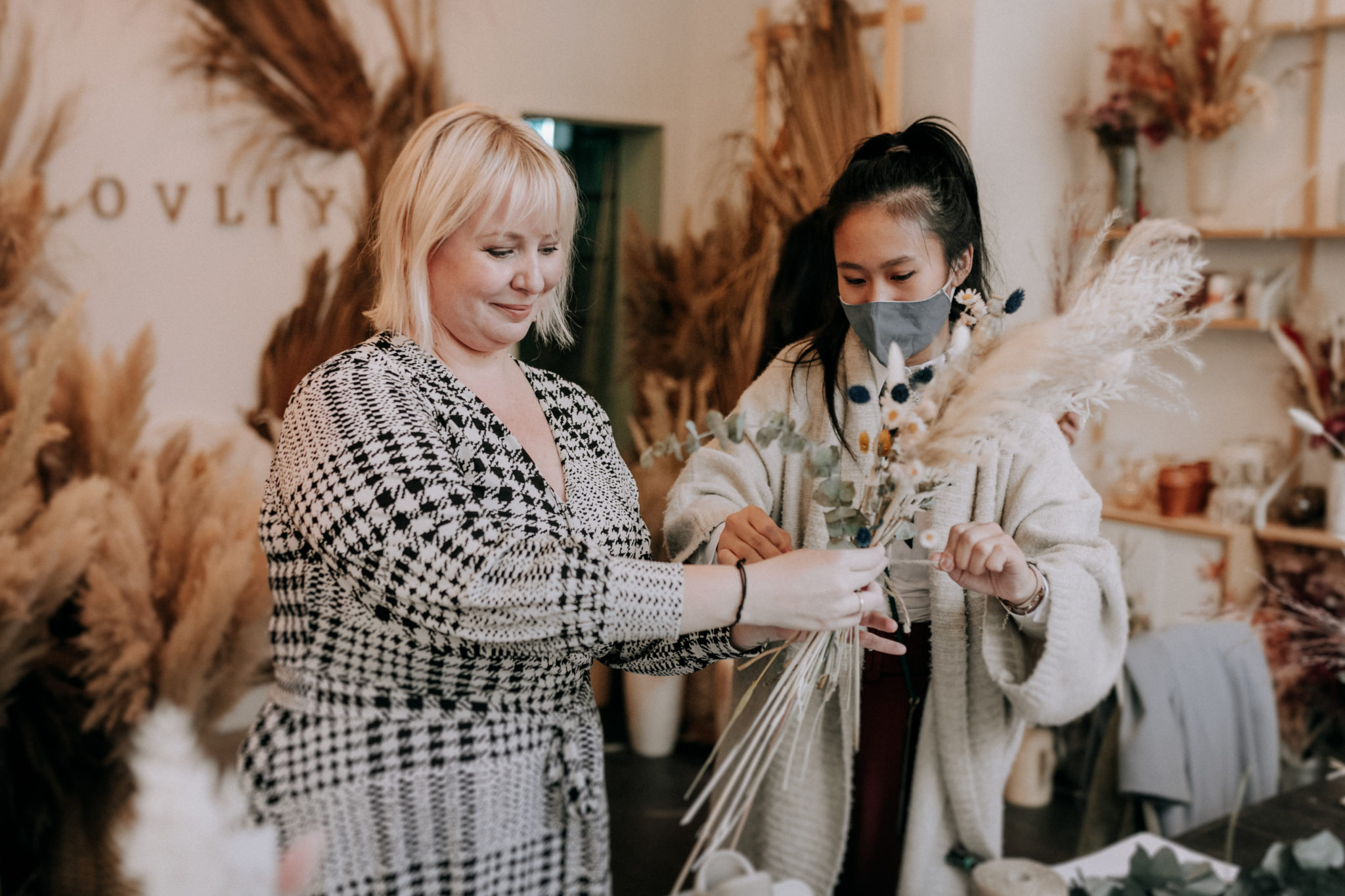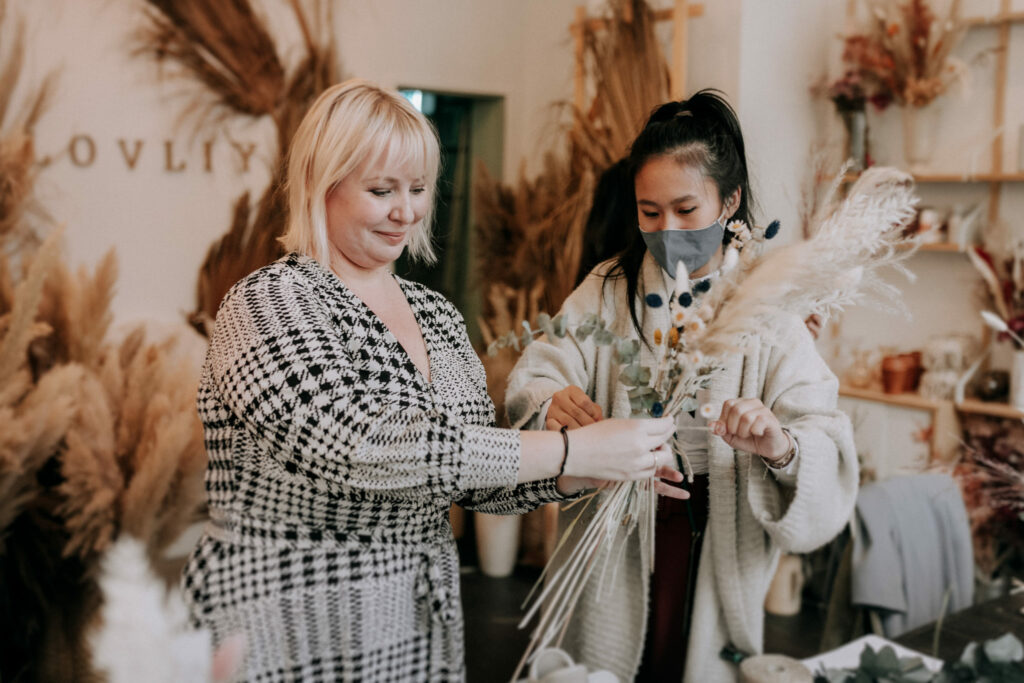

In today’s retail environment, in-store events are one of the best ways to bring customers to your store and “activate” your brand with local audiences. By taking an experiential and interactive approach, you can delight and surprise local customers who may not have otherwise stepped into your store.
A well-planned event can ultimately do much more than delight and surprise, though. You can also create a lasting emotional connection with the community and inspire shoppers to share your brand on social media. This kind of brand loyalty can encourage word-of-mouth advertising that takes on a life of its own long after the event is over. Here, we’ve gathered some tips and inspiration to make your store’s events as successful as possible.
13 experiential event ideas
1. Sales, raffles, and contests
If you’re hoping to sell some of your extra inventory, having a store-wide sale event can help bring customers into your store while making room for new products. A sale event can take place over the course of a few days or on one exclusive evening. You can also run raffles during the sale event or hold a competition and give out gift cards or products as prizes. For example, if you specialize in beauty products, you could hold a contest for most creative makeup, if you sell arts and crafts, you could hold a competition for best DIY project of the evening, and if you’re a pottery store you could hold a wheel-throwing competition. Regardless of the specific event, incorporating contests or games like scavenger hunts into a sale is likely to increase customer interest and get more new shoppers in your door.
2. Launch parties
If you’re opening a new business, a launch party is a great way to celebrate your grand opening. Consider offering discounts exclusive to the event and invite some of the makers whose goods you’re selling in your store to attend. You can also hold a launch party for when top-selling brands release new and exciting products. Regardless of the specific launch, these events are a great way to bring together suppliers, influencers, and frequent shoppers and inspire social media engagement, customer loyalty, and repeat purchases.
3. Yoga and fitness classes
Yoga and other fitness classes don’t only take place in gyms and studios anymore. Practically any retail business with enough space in an appropriate setting can partner with local instructors to host classes ranging from yoga and pilates to dance and high-intensity interval training and more. Just make sure you have enough space for the anticipated number of attendees to spread out with their yoga mats or other gear. It might also be a good idea to host the classes before opening hours and open just as the class finishes, so attendees can make a purchase before they leave.
This is an obvious match for sporting goods stores and athletic apparel shops, but health food stores and other businesses in the wellness space are also good venues. Practically any local business could also be the starting point for a running club on weekend mornings where attendees might have access to discounts or samples after the run is over. There are even yoga classes held in craft breweries, tap rooms, and bottle shops where attendees purchase a ticket in advance and get a complimentary beverage (including nonalcoholic options) after the class is over.
4. Classes, workshops, and lectures
Hosting a class, workshop, or lecture can teach customers about your products and build interest in new products while fostering a sense of community. For example, a store that sells wine or beer could host a tasting event, a craft store could host a DIY event where customers learn a new skill, and a kitchenware store could host a cooking class.
Stores with larger spaces can typically host educational events whether the store is opened or closed, while smaller shops can host such events after closing time. Whether you host an educational lecture, a hands-on class, or an interactive workshop will depend on your specific business, but no matter what you plan, the goal should be to create a deeper bond with customers and build a strong community.
5. Meet-and-greets
Successful bookstores have figured out that author readings and signings are essential because they benefit both the customer and the store. At author readings, customers enjoy a unique experience while the store sells the books being signed. Regardless of your type of retail store, there are similar approaches you can take to events. Consider inviting the artists and makers behind your products to visit your store for a special event. You can even invite local celebrities like professional athletes or celebrated chefs to stop by for a meet-and-greet at your store. When planning a meet-and-greet event, you’ll want to ensure the pairing benefits your brand as well as your guest, and that the event encourages people to make a purchase.
6. Charitable partnerships
Hosting a fundraiser for a cause that’s important to your customers can benefit charity while allowing shoppers to feel good about their purchases and your business. Partnering with a charity can also encourage more loyalty from your customers. Consider creating a partnership with a charity where a portion of your proceeds are donated, and kick off the partnership with an in-store shopping event. Customers are usually willing to spend a little bit more money when they know they’re money is going to a good cause.
7. Pop-ups
Temporary pop-up shops can be a great way for smaller retailers to capitalize on trends and reach new customers in areas they don’t normally serve. Consider taking some of your most unique and best-selling products with you and set up a pop-up shop in a heavily trafficked neighborhood or craft fair. Smaller pop-up trucks—similar to a food truck—are also a great way to catch the attention of passersby in almost any location. Retailers with larger stores might consider hosting a pop-up event at their store where a section of the store is allocated for a brand partner to offer their goods and interact with customers.
8. Meetup groups
Hosting meetup groups can help build brand recognition and a positive image for your store. A meetup typically encourages local people with common interests to come together at the same time once or twice a month for a specific activity or just to get to know one another. Ideally, these are people who are interested in the kind of products you sell. This allows current and potential customers to interact with one another and make connections based on common interests.
For example, if you own a pet store, you might consider hosting a meetup group for owners of specific breeds of animals such as French bulldogs or cockatoos. This type of event will likely bring together some current customers as well as new potential customers who will probably remember your shop when they next need pet supplies. To make the most of hosting a meetup group, make sure to have your inventory stocked with pet products relevant to those attending.
Whatever type of products you sell, regularly hosting meetup groups for locals can help your shop become part of the community rather than just a place of business.
9. Community events
Community events can help support the industry you’re in—and the products that you sell—while building a more positive image for your brand with your target audience. Similar to meetup groups, these events can position your store as an integral part of the local community. Makers markets, educational events with guest speakers, mini music festivals, road races or other athletic competitions, and health and wellness fairs are just a few examples of community events that unite attendees around common interests that might tie in with the products you sell.
These types of events are ideal for stores with ample space that naturally unite people around a shared interest, like arts and crafts stores, hobbyist shops, sporting goods and bike stores, pet stores, comic book shops, video game stores, and health food shops.
10. VIP events
If you sell high-end and one-of-a-kind products, one way to set your store apart from competing businesses in the area is by hosting an invitation-only or “VIP” event. For example, an apparel or jewelry store might host a sample sale via special invitation. Just make sure to send a personalized invitation to attract your most exclusive clients’ attention, and if you’re offering discounts, provide them with a promo code so it feels like it’s “just for them.”
This type of in-store event appeals to more discerning buyers who are looking for something unique that they won’t find anywhere else. Invitation-only events create a sense of exclusivity and can also be used to reward loyal, high-spend customers with something that makes them feel special.
11. Holiday events
Holiday events should give new shoppers a reason to walk into your store, like exciting new seasonal merchandise, discounts on last season’s products, contests, or giveaways. The festive fall and winter season is a great time to schedule in-store events because shopping tends to peak naturally around that time. Depending on your products and customer demographics you might also host events around Pride Month, Halloween, Valentine’s Day, Mother’s Day, or any number of other holidays and seasons.
12. Fashion shows
If you sell men’s and/or women’s apparel, kids’ and baby clothing, shoes, jewelry, or other accessories, you can create a sense of magic and delight your customers by hosting a fashion show. Start by picking a date with enough time in advance to plan how you will arrange the runway and lighting, which items will be on display, who will model the items, and who will emcee the event.
You could ask attendees to model looks they’ve put together with merchandise in your store, recruit friends and employees to act as models, or consider hiring local models to show your products off in the best possible light. You might even consider hosting a silent auction with one highest bidder going home with their favorite look from the show. With some lively music and light refreshments, you can make it an event worth remembering (and worth sharing on social media).
13. Rent out your space
By renting out your space, you can offer an in-store experience without doing the heavy lifting yourself. This type of event brings in additional foot traffic from potential customers while saving money on planning, marketing, staffing, supplies, training, and more. You can even turn a profit by charging a flat rate to rent the space or charging commission on products sold during the event. This works well for arts and crafts shops, bookstores, camera and photography supply stores, hobbyist shops, pet stores, and other niche businesses.
For example, an arts and crafts shop might create a gallery space and feature a local artist (or curated collection of artists) for a few weeks and kick it all off with an opening night to create social media buzz for the artist and the business. Similarly, a camera shop might close off a dedicated space to exhibit local photographers’ work or for photography classes taught by professional instructors. Ideally, visitors will have to walk through the shop and see the products for sale before getting to the gallery or event space. While there might be some setup costs to prepare your space to be rented out, or extra payroll expenses if you need to extend your opening hours, this type of in-store event can boost brand awareness with relatively little effort on your part.
Planning and marketing your event
Planning an in-store event can be daunting if you don’t know where to begin. When considering your next event, start by thinking about your goals. What do you want customers to get out of your in-store experience? When and where will it be? Who do you want to attend? Next, think about the demographics and shared interests of your target customers and the communities where they live.
To get the most out of your in-store events, spreading the word through marketing is key. Start with email invitations to loyal customers and local influencers, social media promotions including Instagram stories and Facebook events, and in-store materials including flyers and posters. During the event, you can share photos and videos on social media to entice viewers to attend a future event, and encourage attendees to share photos and videos on their own social media accounts and tag your store. Finally, send a thank you to attendees after the event to let them know they’re appreciated and increase the likelihood of them attending your next event.





